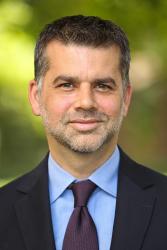

10:00 am EDT - 11:30 am EDT
Past Event
10:00 am - 11:30 am EDT
1775 Massachusetts Avenue NW
Washington, DC
20036
The defining development challenge for the next 15 years will be whether rapid progress can be made in conflict-affected places. The historical record is mixed. Some countries, for example Cambodia, have put conflict behind, achieved rapid economic growth, and brought down poverty levels significantly, while others, such as Afghanistan, continue to have stubbornly high rates of poverty with little discernable progress over the last decade.
On April 7, the Global Economy and Development program at Brookings hosted a discussion on the links between security and development. Japan International Cooperation Agency President Shinichi Kitaoka lead off with a keynote address on the interaction between security and development and what Japan has learned from its development cooperation in Mindanao, Syria, and South Sudan. He then joined a panel discussion moderated by Brookings Senior Fellow Homi Kharas.


Landry Signé, Christopher Kirigua, Florizelle Liser
February 25, 2026
2026
The Brookings Institution, Washington D.C.
Wednesday, 9:30 am - 12:00 pm EST

Albert Zeufack
February 24, 2026